We set out first for the wax museum first since it closes at 4:00 p.m. and a review site indicated the average stay was two hours. Some reviews were very positive like this one from ten months ago:
★★★★★ 10 months agoOf course, you have to balance that with this:
It's a good and nice place in Helwan
★★★★★ 7 months agoBut he still gave it five stars?
It's deadly boring
You can only imagine our disappointment when we reached the site and were told it has been closed since the revolution! Wikipedia's entry says it was closed in 2009 for renovation - apparently a lengthy project. On the other hand, WikiCommons provides a picture that appears to come from May of 2016.
This is Egypt. You just don't know - even when you ask.
We moved on to the Museum Palace of King Farouk along the Nile.
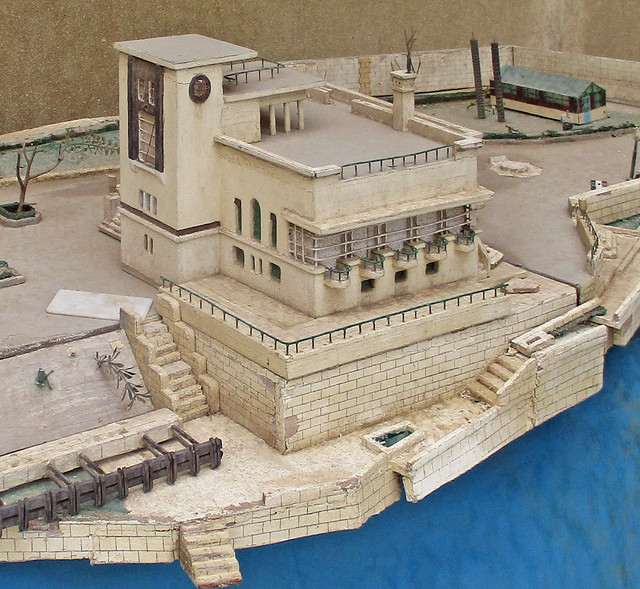
That is a picture of a model of the palace that is on display near the front door.
The king had two "rest houses" - the better known one is found near the great pyramids of Giza. The front entrance to this one is not very imposing. I pictured the king arriving and feeling very underwhelmed until I realized that he would arrive via the Nile on the royal yacht at the dock depicted in the model.
Here is the actual front entrance.
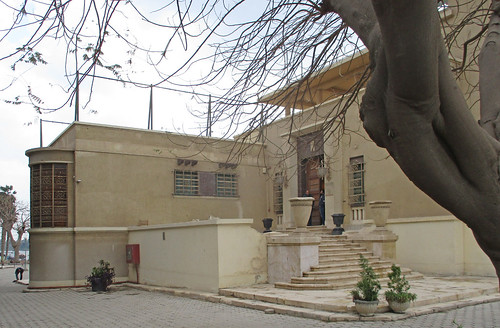
Admission is only 50 EGP (about $3) for a "foreigner." Locals get quite a break at only 5 EGP. We look at that and think "How nice that Egyptians get such a discount to learn about part of their history." It is easy, however, to find Egyptians who will interpret the discount differently. "The government is saying we are worth only one-tenth of a foreigner," is their view.
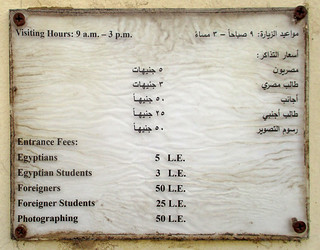
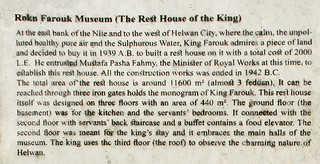
Only the first floor of the home is open to the public so this is not a long tour but there is a lot of "story" packed into the tiny museum. The era of King Farouk, who ascended to the throne in 1932 at the age of 16 and was deposed in the revolution of 1952 has inspired numerous books. Local museum guide, Ahmed, filled in details for us about the photos, paintings and antiques. He said the king seldom visited this rest house.
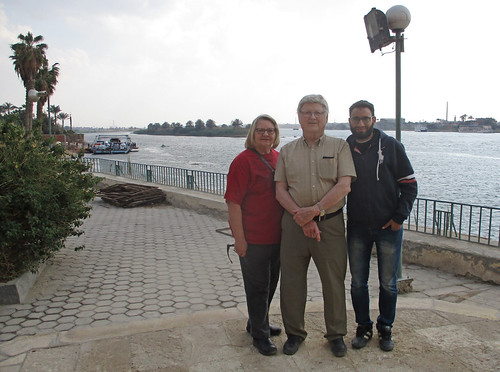
While there are three floors in the building, only the first is open to the public.
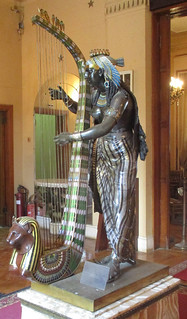
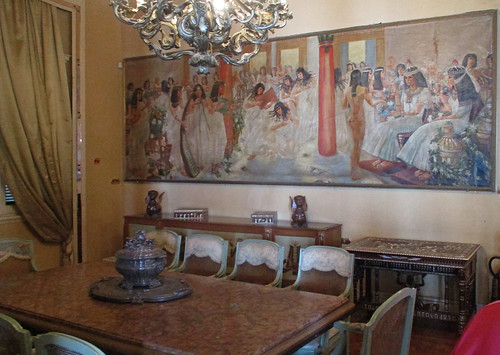
An article at the end of this Ministry of Antiquities newsletter gives this bit of information about the furnishings:
Today, the Museum houses furniture that was once used in the royal rest house by the pyramids of Giza. Much of this furniture is inspired by ancient Egyptian art, or direct copies of ancient Egyptian furniture.I thought that the radio/phonograph was one of the most interesting items. Others may have a different opinion. I pictured the king sitting by the radio, drawing smoke from his water-pipe as he tuned to the BBC, French, Italian and German broadcasting services during the build up to World War II.
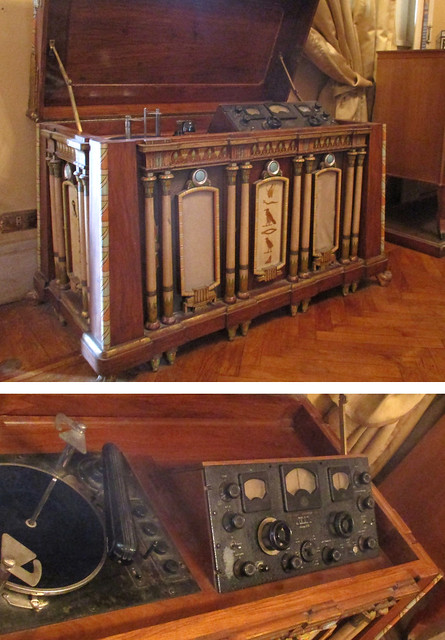
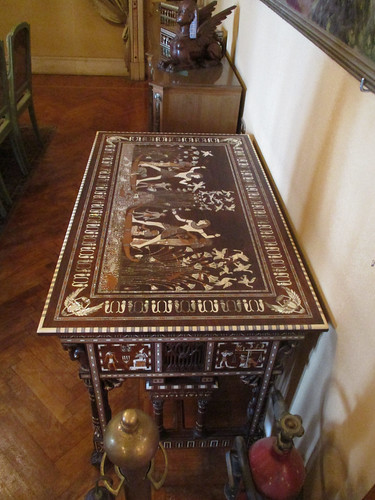
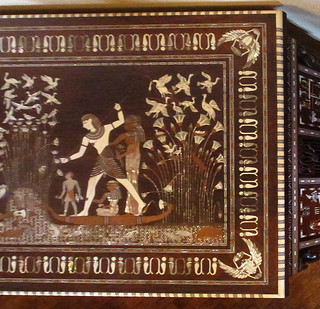
The photo of Farouk's sister, Princess Fawzia, and the royal bedroom with bassinet for the son might get a visitor interested in checking out some twentieth century Egyptian history.
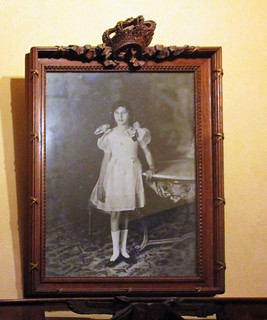
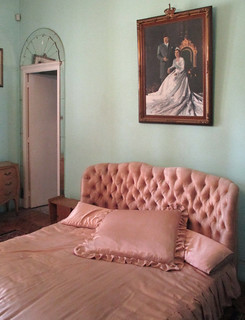
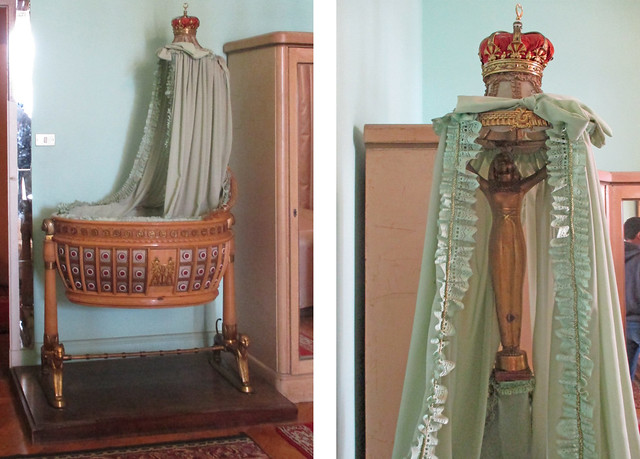
A curio cabinet has some particularly nice looking boxes that we have not seen being duplicated by today's local artisans.
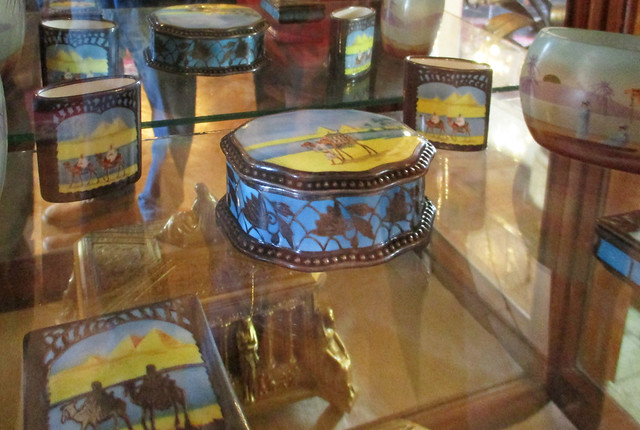
The grounds seem very well maintained and later in the year probably have a good deal more color, but they seemed nice enough for us to pause for a portrait even now.

Following the museum visit, we headed back into town and stopped just past the Ring Road at Antar, a restaurant along the Nile Corniche for dinner. The English language version of the menu displayed only a fraction of the total items available - and was not particularly inspiring.
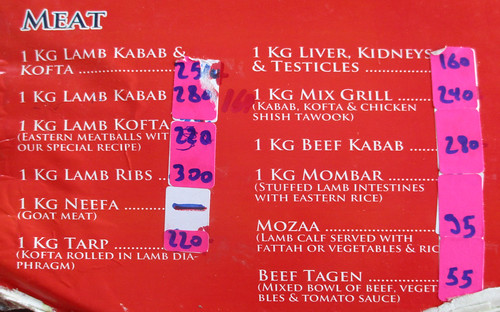
This turned out, though, to be one of our best meals of the winter. The lamb and chicken from the grill were excellent and the appetizers were by far the best we have been served.

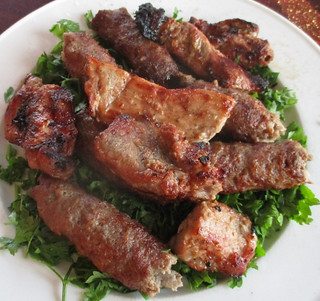


----------------------------------------------------------------------
* Shaspo Tours has this to say about the Helwan Wax Museum:
The Helwan Wax Museum stands among several museums abound by the city of Cairo, located in Helwan suburb and is one of the most important museums in Egypt not only because of its rare holdings telling the stages of evolution in the Egyptian history from the beginning of the Pharaohs to the modern era, but also with the contents of the museum’s meticulously made waxy statues that mad professionals to put the museum in the second place on the most famous wax museums in the world.






2 comments:
The Clematis condo appears like it may ride on the rear of the Jurong Lake District development. If you are curious to know more about Condo, here you can get more information about it.
Love the photos in this post. That radio especially is so evocative -- I loved your vision of the king sitting next to it, smoking a water pipe and listening to foreign broadcasts. Writing historical fiction as you walk around.....And the bassinet is also great.
Post a Comment